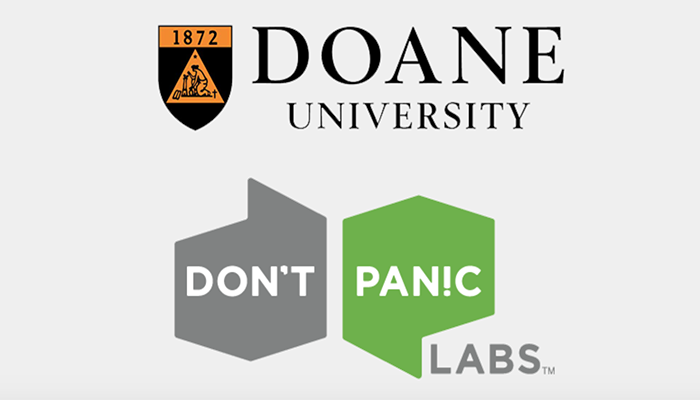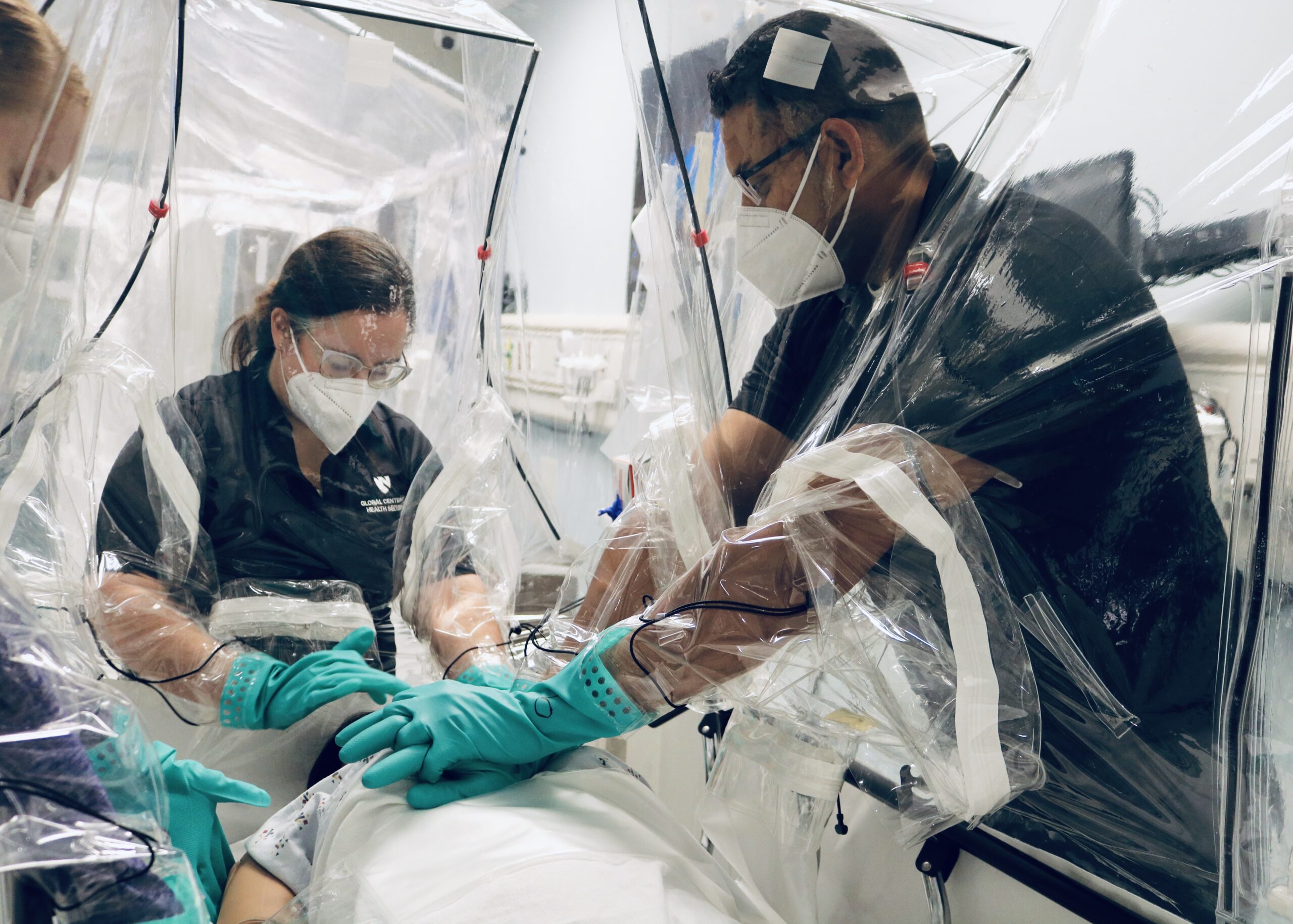Lincoln-based software development company Don’t Panic Labs and Doane University have teamed up to turn non-tech employees at sponsor organizations into fully fledged software engineers.
The comprehensive initiative, called the Nebraska Dev Lab Pipeline Program, aims to strengthen Nebraska’s tech workforce and grow a larger, more diverse talent pool for employers to choose from when hiring. Approaching its second year, the program is now accepting applications for sponsor companies and participants to take part in its next cohort set to begin January 2021.
“We want to create people that we’d want to hire ourselves,” said Chad Michel, senior software architect at Don’t Panic Labs. “And there’s also the notion of trying to help people who are underemployed. They may be in an OKjob at some company, but they could be in a position that quite possibly does make quite a bit more money for them and their family with some sort of job change. And we really want to try to provide this opportunity for people that maybe wouldn’t have had this opportunity before, and especially to get women and minorities into the field more.”
Here’s how it works. Sponsor companies cover program tuition for sponsored participants, assist with living expenses over the nine-month immersion program, and commit to placing the newly trained employees in developer positions upon graduation.
Taught by a mix of Doane University faculty and Don’t Panic Labs software architects, Nebraska Dev Lab participants develop general programming knowledge as well as the specific coding language skills they will need in their post-graduation workplaces, spending an eight-hour workday learning and practicing the fundamentals of computer programming. Weekly seminars, ongoing mentorship, a capstone project, a professional development plan and an apprenticeship round out the pipeline.
“We’re trying to set them up so when they are full-time employees at the host organization, they come in and are able to be very successful for that host organization almost immediately,” said Michel.
The pilot cohort began in January, with six students representing ALLO Communications, Nelnet, NRC Health, Doane University and Don’t Panic Labs. When the pandemic hit, participants barely missed a beat as the program went entirely virtual, Michel said.
The program is divided into four stages, progressing from learning the absolute basics of computer science in a Doane University classroom, to real-world learning under the guidance of Don’t Panic Labs software architects, to a group-wide collaboration on a capstone project, to working an apprenticeship at the company whose IT departments they will join after graduation.
Students in the initial cohort, now in the third stage of the program, are working on their capstone project for a local nonprofit community partner. Using .NET for the back end and Ionic for the front end, they are currently building a mobile app for the Nebraska State Suicide Prevention Coalition focused on preventing suicide among teenagers and young adults. When completed, the app will give its users a way to diary their thoughts in the context of daily interactions with schools and other activities, while also providing a list of mental health resources.
The app, which received additional funding from Omaha’s Kim Foundation, comes at a critical time in history as the Centers for Disease Control and Prevention reports a COVID-related uptick in mental illness, substance use and suicidal ideation.
Michel stressed the importance of developing technology to benefit the greater community, but that he also personally enjoyed witnessing the enormous progress students made since the program began.
“They started with very, very little coding knowledge,” he said. “(Alec Engebretson, professor of information science and tech at Doane University) had to teach them things like how to store things in variables, the basics of comparative programming. And taking them from that to building functional applications.”
The brainchild of Doane professor Alec Engebretson and Don’t Panic Labs CEO and co-founder Doug Durham, Nebraska Dev Lab hopes to grow the number of women and minorities working as coders, Michel said, referencing research demonstrating increased workforce diversity may increase innovation.
“Addressing the tech talent shortage in Nebraska is something we’ve been working on for over five years,” Durham said. “The challenge our region is facing is not unique. But our state is positioned to simultaneously grow the number of qualified developers while also increasing diversity in our industry.”
Local corporations attest to the need for tech education pipeline programs like Nebraska Dev Lab.
“It’s no secret that businesses everywhere — not just in Nebraska — are struggling to hire qualified software developers,” said Jeff Noordhoek, CEO of Nelnet. “Addressing this problem will require us to think differently, and that’s what we see in Nebraska Dev Lab’s approach. We’re proud to be sending three of our current employees through the program, and we look forward to watching them grow through this opportunity.”
Though Nebraska Dev Lab participant Rafael Simosa admitted he still had a lot to learn about programming, he said he has gained a ton of knowledge so far.
“We have an amazing study plan and plenty of time to develop our skills, and the program gives us a really good foundation to further develop our careers,” Simosa said.
Although powerfully transformative for the students and sponsoring organizations involved in the program, Michel said Don’t Panic Labs realizes that a single pipeline program cannot fill the tech talent gap. Additional partnerships in other cities are necessary to complement the efforts of Nebraska Dev Lab and yield the requisite collective impact sought by community leaders.
That’s exactly what is happening. In addition to the Lincoln-based Nebraska Dev Lab, there is a similar full-time tech pipeline program for career changers in Omaha. Callers to Coders, a partnership initiative of Physicians Mutual and AIM Code School, transforms employees in Physicians Mutual’s call center into programmers in the company’s IT department.
“It’s very encouraging to see what Don’t Panic Labs, Doane University, Physicians Mutual, AIM Code School and Nebraska Tech Collaborative are all doing to build the tech talent pipeline in the Midwest,” said Itzel Lopez, AIM institute’s vice president of advancement and community operations. “The need for tech talent has made it historically difficult for businesses to invest and reinvest here. Companies that need technology to operate their business should become part of the solution and sponsor high-potential employees for one of these innovative tech talent workforce development programs.”
Simosa, from the viewpoint of someone whose life has been changed by such a program, agreed that more tech pipeline initiatives are needed in Nebraska.
“Programs like these help communities improve by providing tools that weren’t available before,” he said. “(Nebraska Dev Lab) in particular allows you to focus 100% on learning, because you don’t have to worry about working to pay the bills. We are getting paid to learn by industry professionals that have a lot of experience and a lot to offer.”




